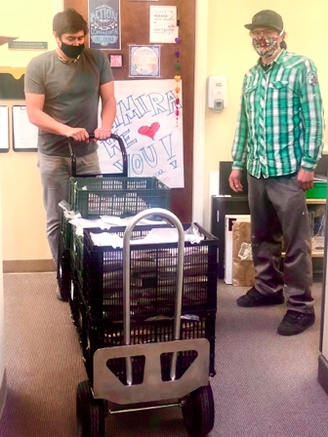Jessica Cejnar / Friday, March 5, 2021 @ 1:08 p.m.
Community Food Council Offers Grants to Local Fishermen Wanting to Distribute Seafood Locally

Pacific Native Fisheries delivers fresh seafood to the Family Resource Center of the Redwoods. Photo courtesy of the Community Food Council
A Community Food Council project aims to help locals access local seafood by offering grants to local fishermen.
Using fishermen COVID-19 relief dollars from Catch Together, the individual $2,500 grants will help fishermen pay for a multi-functioning fish business license needed for commercial fishermen to sell locally, according to Community Food Council Food Program Coordinator Andrea Lanctot. Fishermen can apply on the Food Council’s website by March 12.
“It doesn’t matter what species they’re going for, but essentially most commercial fishermen go out and fish and sell fish to a distributor or processor who buys the fish and ships it out of here,” Lanctot told the Wild Rivers Outpost on Friday. “It’s very rare that fishermen come in and sell it to a restaurant or direct to the consumer at a farmers market.”
According to Lanctot, multi-functioning fish business licenses are about $2,000. The extra $500 will help with extra fees that might come up, she said.
The North Coast Fresh from the Sea Program also aims to provide 29,123 meals to food insecure families and individuals across Del Norte and Humboldt counties, according to a news release from the Community Food Council. The organization is also purchasing salmon, black cod and ling cod from Pacific Native Fisheries, a Yurok family-owned business.
The seafood will be distributed through Pacific Pantry, the Del Norte Food Security Task Force and the Klamath-Trinity Resource Conservation District in Hoopa. Fish will also go to the Del Norte and Humboldt senior centers for their Meals on Wheels programs and to St. Vincent de Paul for the meals they prepare for the homeless.
A portion of the grant funding will also go toward the Yurok Fisheries Tribal Elders Fish program as well as a series of workshops led by the Ancestral Guard.
Lanctot said the Community Food Council is also hoping to work with local fishermen to help identify local markets for their catch such as a restaurant, farmers markets or selling directly to the consumer.
“What we are hoping is to work with fishermen that are interested and see what their goals are,” she said.
These goals could be to get fish into local restaurants, supermarkets or farmers markets, Lanctot said. The Community Food Council could help them make connections.
“I think on a larger scale where we want to go with it is working with larger institutions like the school district or the hospital or prison,” she said. “Those would be our huge buyers. We’re just looking at this as sort of our step in that direction.”
One of the constraints, however, is finding a place to process fish, which requires a commercial kitchen that would fit with public health requirements, Lanctot said.
Catch Together is a national organization whose grants were offered nationwide, Lanctot said. The first grant round went to fishermen directly and the second will go to help local fish get in food banks and local food distribution.
In addition to being able to find the grant application on the Community Food Council’s website, those interested in being part of future programs can contact Lanctot at alanctot@frcredwoods.org.
Tribal members wanting to attend Ancestral Guard workshops should call Peter Gensaw, Ancestral Guard cultural director, at (707) 496-2655.
CLICK TO MANAGE